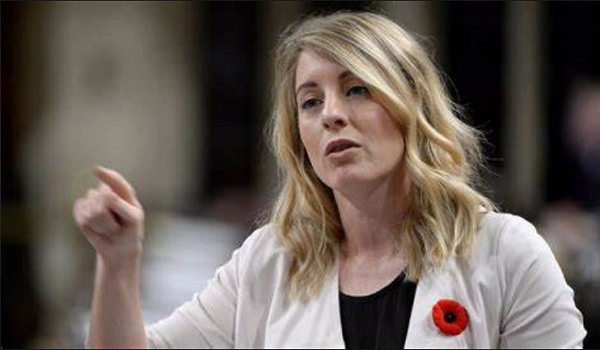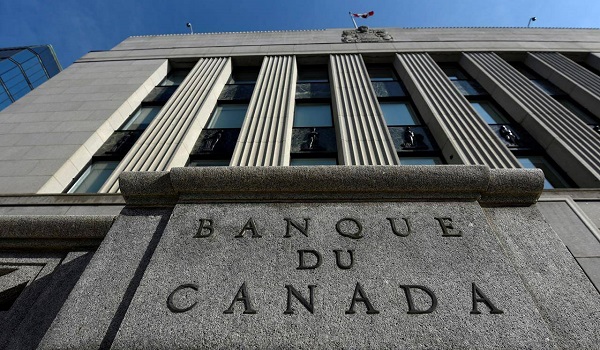Palestinian Canadians allege Canada’s military exports to Israel as illegal, to sue Foreign Affairs Minister Melanie Joly
A group of Canadian human rights lawyers and Palestinian Canadians who have lost family and friends in Gaza plans to sue Foreign Affairs Minister Mélanie Joly to block exports of military goods and technology to Israel, arguing the Trudeau government is in breach of Canada’s domestic and international legal obligations.
The lawsuit is to be filed Tuesday in the Federal Court of Canada by Canadian Lawyers for International Human Rights (CLIHR), joined by a Palestinian non-governmental organization called the Al-Haq-Law in the Service of Man, and a number of Palestinians living in Canada, including one who is seeking asylum status here.
“We see it as absolutely necessary to seek this court order,” said Henry Off, a board member with the Canadian lawyers group that charges Joly and her department have been deliberately vague about exactly what military items Canada exports to Israel.
“We need to cut off Canada’s contributions to the bombardment and starvation of Gaza. It is also important for Palestinians and Palestinian-Canadians to be a part of this case,” Off said in a statement to the Star. “They are the ones suffering.”
Their court challenge follows a letter they sent to Joly three weeks ago which received no reply, he said.
They argue Canada’s domestic export law requires Joly to suspend military exports if there is a “substantial risk” the equipment or technology can be used to commit serious violations of international law — in this case a feared “genocide” in Gaza contrary to the Geneva Conventions — or to commit serious acts of violence against women and children.
They want a court to declare unlawful and to quash any export permits issued by Joly since the Oct. 7 attack by Hamas on Israel launched the all-out land, sea and air war on Gaza in retaliation. The government acknowledges it has authorized at least $28.5 million of new export permits under the category of military goods and technology exports to Israel during the first two months of the war. But it denies any are for weapons or weapons systems, saying it has approved only “non-lethal” exports.
The groups challenging Ottawa acknowledge the Hamas attacks are serious violations of international humanitarian law, which may amount to war crimes and crimes against humanity. Nearly 1,200 were killed and about 240 civilians and Israeli soldiers were taken as hostages into Gaza, with an estimated 134 hostages still held or unaccounted for.
But they argue Israel’s conduct of a massive air and ground campaign in retaliation is, in turn, an overwhelming violation of many fundamental principles of international human rights and humanitarian law, laws on armed conflict, and constitutes serious violence against women and children.
They cite more than 30,000 Palestinian deaths reported by Palestinian authorities, forced displacement of about 1.7 million people fleeing the military operation, what they call indiscriminate attacks on civilian homes, hospitals and other sites, attacks on so-called safe zones and other allegations of arbitrary detention, inhumane treatment and sexual assault of Palestinian women.
It asks a Federal Court judge to declare Canada is in breach of its domestic and international obligations, not to be complicit in such acts, and to order the government to immediately cease all further export approvals to Israel.
Two weeks ago, Joly told reporters there have been no requests for permits to export weapons to Israel and that Canada only exports “non-lethal” technology. Her department has denied exports of “full weapons systems.”
But the department’s records, first reported by online publication The Maple, and confirmed to the Star, show Ottawa has approved shipments of goods that Joly’s critics say are military goods and technology, and at the least, dual-use technologies that should be halted.
In response to NDP criticism, Prime Minister Justin Trudeau denied exporting weapons, telling reporters on Jan. 31 Canada’s arms permitting regime is “among the most rigorous in the world. We have not issued permits since Oct. 7.”
Last month, an International Court of Justice (ICJ) tribunal issued a provisional ruling that ordered Israel to take measures to prevent any acts in its military campaign that violate international law against genocide, or incitement to genocide. It also calls on Israel to “enable the provision of urgently needed basic services and humanitarian assistance to address the adverse conditions of life faced by Palestinians in the Gaza Strip.” The ICJ has not yet heard the full case, launched by South Africa.
But its interim ruling heightened calls on Israel’s western allies to do all they can to stop human rights abuses.
Asked whether Canada views the ICJ ruling as requiring Ottawa to cease issuing any new export permits, Jean-Pierre Godbout, a Global Affairs spokesman, declined a direct answer.
“Canada supports the ICJ’s critical role in the peaceful settlement of disputes and its role in upholding the international rules-based order. The court’s decisions on provisional measures are binding on the parties. Parties to any conflict must protect private citizens and respect international law,” he said in a written reply to the Star.
Italy, Australia, and Spain have halted the export of military items to Israel since the war’s start while subnational governments in Belgium and companies in Japan say they are also suspending exports to Israel.
Global Affairs data shows the Trudeau government has authorized at least $28.5 million of new permits for military exports to Israel during the first two months of the war.
Godbout said that, “In recent years, the government has not received, and therefore not approved, any export permits for weapons to Israel. The permits issued since Oct. 7, and in fact all permits that are currently open, are for non-lethal equipment.”
He said export-controlled items include “a wide variety of goods and technology designed for both civilian and military purposes, examples of which include telecommunications equipment, decontamination equipment, cryptographic equipment, protective equipment, simulators, imaging equipment, electronic components, firearms, and ammunition.”
However, the coalition of lawsuit applicants says the Canadian government is obfuscating.
Off cited the approval of four permits worth $1.7 million that authorized transfer of goods under a category broadly labelled as “bombs, torpedoes, rockets, missiles, other explosive devices and charges and related equipment and accessories, and specially designed components.”
Another $18.4 million in permits covers items categorized as “electronic equipment.” Other permits were issued in a category that included “‘aircraft,’ ‘lighter-than-air vehicles,’ ‘unmanned aerial vehicles’ (…) aero-engines and ‘aircraft’ equipment, related equipment, and components.” Additional permits covered items in a category including “ground vehicles and components,” and “fire control, and related alerting and warning equipment.”
This article was first reported by The Star












